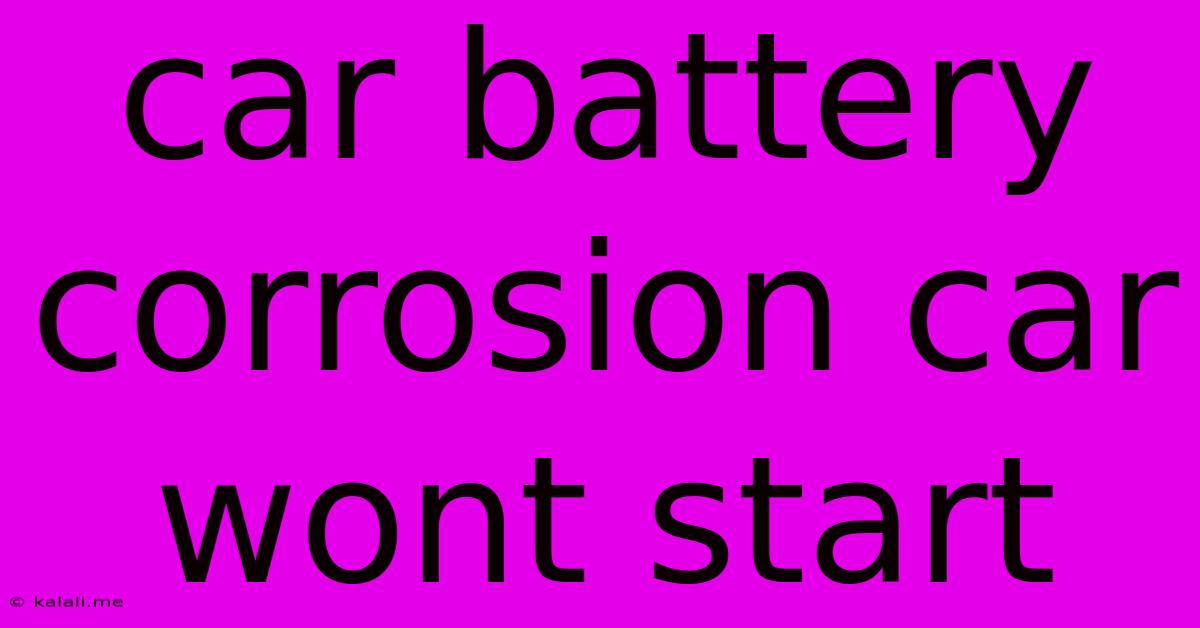Car Battery Corrosion Car Wont Start
Kalali
May 24, 2025 · 3 min read

Table of Contents
Car Battery Corrosion: Why Your Car Won't Start and How to Fix It
Car battery corrosion is a common problem that can leave you stranded. If your car won't start and you suspect corrosion, you're in the right place. This article will explain why battery corrosion prevents your car from starting, how to identify it, and most importantly, how to safely clean it and get back on the road. Understanding the causes and solutions can save you time, money, and frustration.
What Causes Car Battery Corrosion?
Car battery corrosion is a whitish-gray or greenish-blue crusty buildup on the battery terminals. This buildup is a result of a chemical reaction between the battery's acid (sulfuric acid) and the surrounding metal. The reaction is exacerbated by humidity, road salt (especially in winter), and battery acid leaks. Over time, this corrosion insulates the terminals, preventing proper electrical flow to the starter motor, thus hindering the car's ability to start.
Identifying Car Battery Corrosion:
Recognizing the signs of corrosion is crucial. Look for:
- White, powdery substance: This is the most common sign. It's often found around the battery terminals (positive (+) and negative (-)).
- Green or blue crystalline deposits: These indicate a more severe case of corrosion, possibly from a leak.
- Loose or corroded cables: The cables connecting the battery to the car's electrical system may be loose or covered in corrosion, further impeding electrical flow.
- Slow engine cranking: A weak cranking sound from the engine could be a sign of poor electrical connection due to corrosion.
How Car Battery Corrosion Prevents Your Car From Starting:
The corrosion acts as an insulator, significantly increasing the resistance between the battery and the starter motor. This increased resistance limits the electrical current flow needed to engage the starter. Without sufficient current, the starter motor won't turn, leaving you with a dead car. The severity of the corrosion directly correlates to the level of starting difficulty; light corrosion might result in sluggish cranking, while heavy corrosion might prevent starting altogether. Therefore, addressing this issue promptly is key to maintaining your vehicle’s reliability.
How to Clean Car Battery Corrosion Safely:
Cleaning a corroded battery requires caution, as sulfuric acid is highly corrosive. Always wear safety glasses and gloves. Here’s a step-by-step guide:
-
Disconnect the battery: First and foremost, disconnect the negative (-) cable from the battery terminal. Always disconnect the negative terminal first and reconnect it last. Then, disconnect the positive (+) cable.
-
Prepare your cleaning solution: A mixture of baking soda and water (a paste-like consistency) is effective. Some people also use a commercial battery terminal cleaner, following the manufacturer's instructions carefully.
-
Clean the terminals: Apply the baking soda paste generously to the corroded areas on both terminals and cable ends. Use a wire brush or a stiff brush to scrub away the corrosion. For stubborn corrosion, you may need to repeat the process.
-
Rinse and neutralize: Once the corrosion is removed, rinse the terminals and cables thoroughly with clean water. This helps remove any residual baking soda or acid.
-
Reconnect the battery: After everything is dry, reconnect the positive (+) cable followed by the negative (-) cable, ensuring a tight connection.
-
Inspect and maintain: Regularly inspect your battery terminals for signs of corrosion and clean them as needed. Consider applying a protective coating (like dielectric grease) to prevent future corrosion.
Preventive Measures:
Preventing battery corrosion involves proactive maintenance:
- Regular inspections: Regularly check your battery terminals for corrosion.
- Keep the battery clean: Wipe down the battery and terminals periodically with a damp cloth.
- Use a battery terminal protector: A protective coating or cover helps prevent corrosion from forming.
- Address leaks promptly: If you detect any leaks, address them immediately to prevent further corrosion.
By understanding the causes and solutions for car battery corrosion, you can prevent frustrating breakdowns and keep your vehicle running smoothly. Remember, safety is paramount. Always handle battery acid and cleaning solutions with care. If you're uncomfortable performing this task yourself, consult a qualified mechanic.
Latest Posts
Latest Posts
-
A Man Is A Provider Bible Verse
May 25, 2025
-
How To Start A New Pokemon Sun Game
May 25, 2025
-
How Do You Stop A Text Message From Sending
May 25, 2025
-
Water Smells Like Rotten Eggs Only One Faucet
May 25, 2025
-
Is An Equilateral Triangle An Isosceles Triangle
May 25, 2025
Related Post
Thank you for visiting our website which covers about Car Battery Corrosion Car Wont Start . We hope the information provided has been useful to you. Feel free to contact us if you have any questions or need further assistance. See you next time and don't miss to bookmark.